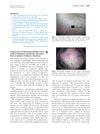Trichoscopic Stages of Dissecting Cellulitis: A Potential Complementary Tool to Clinical Assessment
July 2020
in “
Anais brasileiros de dermatologia/Anais Brasileiros de Dermatologia
”
TLDR Trichoscopy can help diagnose and monitor the progression of dissecting cellulitis.
The article discussed dissecting cellulitis (DC), a chronic inflammatory disease affecting young Afro-descendent men, and highlighted the use of trichoscopy as a complementary diagnostic tool. Trichoscopy helped visualize the disease's progression from early non-scarring stages, which resemble alopecia areata, to the abscess phase, and finally to the fibrotic cicatricial phase. The study suggested that incorporating trichoscopic findings into clinical assessments could improve diagnostic accuracy and treatment monitoring. The authors emphasized the need for further research to validate these observations and recommended trichoscopy for better patient care.








